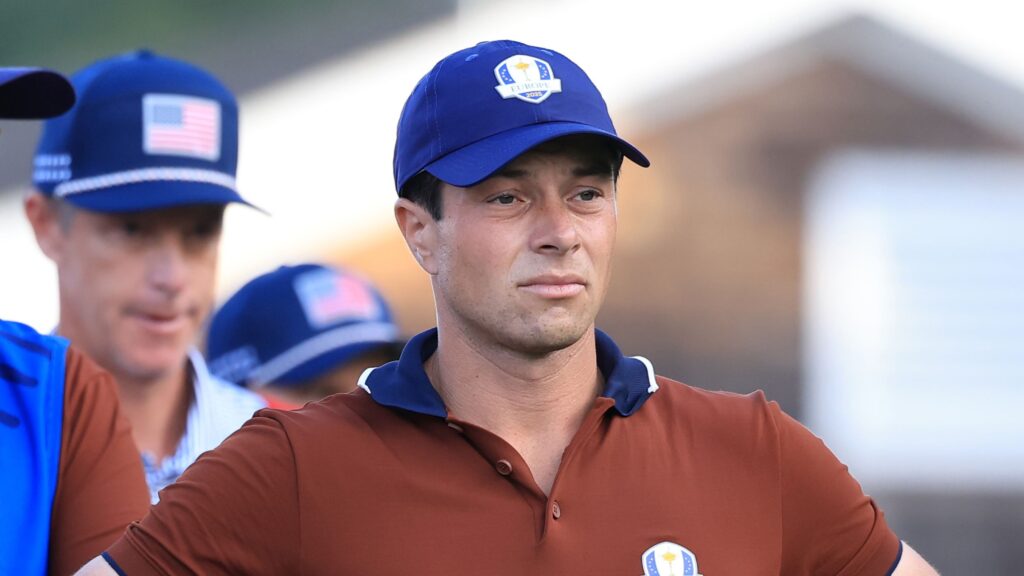Viktor Hovland’s Ryder Cup Withdrawal: A Surprising Turn of Events
Norwegian golfer Viktor Hovland faced a challenging situation during the recent Ryder Cup, where he had to withdraw from the Singles session due to a neck injury. This unforeseen circumstance sparked conversations about the integrity of the Ryder Cup and the rules that govern it, most notably the infamous "Envelope Rule." As the dust settles, Hovland reflects on the emotional toll of the event, emphasizing the camaraderie and spirit that defines the unique tournament.
Understanding the Circumstances of Hovland’s Withdrawal
Midway through the second day of play at Bethpage Black, Hovland experienced significant pain, which forced him to miss the afternoon fourballs. This led to a major reduction in the number of singles matches played the following Sunday. Only 11 matches were held, resulting in a dramatic alteration of the Cup’s dynamics. Hovland, currently ranked World No. 13, admitted that the entire situation was undeniably "upsetting" for him personally, and he sympathized with fellow competitor Harris English, who also sat out due to the fallout from Hovland’s injury.
The Impact of the Envelope Rule
Upon Hovland’s withdrawal, the Envelope Rule was invoked, resulting in both Team Europe and Team USA receiving half a point. This unusual scenario meant that Harris English, nominated as part of Team USA, was forced to remain on the sidelines. Although Team Europe ultimately held their ground and clinched the Cup, many fans expressed disappointment over the situation—not just for the players but also for the integrity of the competition.
The Outcome of the Ryder Cup
Despite Hovland’s absence, Team Europe managed to withstand a significant push from Team USA on the final day, ultimately retaining the Ryder Cup. Even if Hovland had participated, the overall outcome of the match likely wouldn’t have changed. As the final score held at 12-5, the pressure mounted on Team Europe, who only needed two points to clinch victory after Hovland’s withdrawal.
Hovland’s Perspective on the Tournament
In a recent interview, Hovland candidly expressed how the situation affected him, stating, "I felt really bad for Harris, who also didn’t get to play a match, even though there was nothing wrong with him." His heartfelt sentiment underscores the emotional landscape that golfers navigate during competitive events like the Ryder Cup, where every point counts.
Reflections on the Envelope Rule
While discussions about whether the Envelope Rule should change emerged in the aftermath of the Ryder Cup, Hovland felt that maintaining the current parameters may ultimately serve the greater good of sportsmanship. He opined that these circumstances are part of the larger narrative of Ryder Cup history—a legacy of mutual understanding and respect among players.
The Spirit of the Ryder Cup
Hovland emphasized the "spirit of the Ryder Cup," noting that this unique tournament goes beyond merely winning or losing. "I think there’s a mutual understanding that if we were healthy, we would all go out there and play," he remarked. This sense of camaraderie is essential, especially when injuries disrupt expected competition.
Critique of Alternative Rules
Many alternative rules were proposed following the Ryder Cup event, including those that would have provided a full point to the opposing team when a player withdrew due to injury. Hovland’s stance remained that such changes could set a dangerous precedent, allowing teams to strategically manipulate matchups in their favor, unintentionally undermining the competition’s integrity.
Preparing for the Future: Hovland’s Return
In the wake of the Ryder Cup, Hovland faced a difficult decision about whether to participate in the upcoming DP World India Championship. The timing of the event came shortly after his injury, amplifying concerns about his ability to perform. Hovland noted that he took a week and a half off before gradually easing back into competitive play, highlighting the importance of physical health in professional sports.
The Journey Back to Competition
After careful consideration and practice, Hovland decided to participate in the India Championship, stating, "I played two 18-hole rounds back-to-back, and my neck felt okay." His cautious approach to returning demonstrates the balance athletes must strike between competitiveness and self-care, especially when dealing with injury.
Looking Ahead to Future Tournaments
As Hovland prepares to tee off alongside notable fellow golfers like Rory McIlroy and Ben Griffin at Delhi Golf Club, he carries with him the lessons learned from the Ryder Cup. The resonance of team spirit, respect among competitors, and the responsibility that comes with participating in such high-stakes events will surely shape his approach in the future.
Conclusion
In summary, Viktor Hovland’s withdrawal from the Ryder Cup singles session underscored the profound emotional and competitive elements inherent in professional golf. It also highlighted the complexities surrounding sportsmanship rules like the Envelope Rule. As the tournament landscape evolves, so too will discussions around competitive integrity and player welfare, leading to a more thoughtful approach to future Ryder Cups and beyond. Whether on the cusp of victory or dealing with challenges, the spirit of this grand event remains steadfast in shaping the world’s top golfers.


